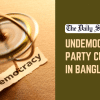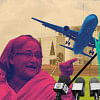Stop retributive violence in politics

The recent killing of a Jubo League leader in Natore, allegedly by BNP-linked men, serves as another grim reminder of the cycle of political retribution that has followed the fall of the Awami League regime, in what appears to be a tit-for-tat response to how Awami League had treated BNP and its affiliates while in power. According to a report, the victim, Saidur Rahman Babu, succumbed to his injuries on Wednesday after a brutal assault. He had been in hiding since his home was attacked on August 5, but on October 30, he was caught by his assailants, tied to an electric pole, and beaten with sticks and iron rods. Saidur's family accused Kabir Hossain Kangal, a Jubo Dal leader, of leading the assault and previously demanding Tk 5 lakh in exchange for his safety.
These vengeful incidents are showing little sign of abating even after three months. It's quite frustrating for those who had expected the culture of political repression to end with the end of an autocrat's rule, paving the way for a politics that truly serves public interests. The ongoing violence and harassment targeting the once-ruling camp raise concerns about a likely resurgence of authoritarianism under different banners. Almost every day, we get to see some troubling sign of authoritarian tendencies—murder, vandalism, threats, opportunistic extortion, forced takeover of properties, frivolous lawsuits, etc. Data from the rights group Manabadhikar Shongskriti Foundation (MSF) also reflects the persistent nature of these politically motivated crimes, with at least 12 fatalities in October, nine linked to Awami League alone.
This, on a broader level, aligns with how political parties that were part of the AL-led 14-party alliance are being targeted, with a report by this daily revealing that many party offices were vandalised, abandoned, and even repurposed. Some public outbursts towards these parties were expected because of their role over the past 15 years, and particularly their complicity or silence during the brutal killings of students and other ordinary citizens during the July-August uprising. But what's happening now seems more politically designed, which is concerning.
We, therefore, call on the interim government and leading political parties to break this cycle of retributive violence. The BNP secretary general on Thursday said that party leaders and activists have "taken a fresh vow to resist hegemonic forces" and safeguard democracy. We appreciate the gesture but would like to see matching actions on the ground. Political parties, including BNP, that once suffered heavily during Awami League's rule must ensure that they don't end up repeating its wrongs. The onus also falls on the government to establish accountability of the excesses being committed, particularly by ensuring thorough investigations and fair trials for all political killings as well as punitive action against anyone committing or inciting political violence.


 For all latest news, follow The Daily Star's Google News channel.
For all latest news, follow The Daily Star's Google News channel. 










Comments